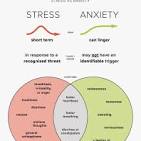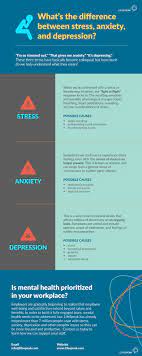Signs of Stress and Anxiety
Stress and anxiety are common experiences in today’s fast-paced world, and it’s important to recognize the signs so that you can take steps to manage them effectively. Here are some common signs of stress and anxiety:
Physical Signs:
- Headaches or migraines
- Muscle tension or pain
- Fatigue or low energy
- Upset stomach or digestive issues
- Rapid heartbeat or chest pain
- Dizziness or lightheadedness
Emotional Signs:
- Irritability or anger
- Feeling overwhelmed or out of control
- Increased worry or fear
- Mood swings or emotional outbursts
- Difficulty relaxing or quieting your mind
- Feeling tense or on edge constantly
Behavioral Signs:
- Social withdrawal or isolation
- Increase in substance use (alcohol, drugs)
li>Nervous habits (nail biting, pacing)
li>Sleep disturbances (insomnia, nightmares)
li>Poor concentration or memory problems/li
li>Increase in procrastination/li
p>If you notice these signs in yourself or someone else, it’s essential to seek support. Talking to a mental health professional, practicing relaxation techniques like deep breathing and meditation, exercising regularly, and maintaining a healthy lifestyle can all help reduce stress and anxiety levels.
Understanding Stress and Anxiety: Key Signs and Quick Relief Techniques
- What are 5 signs you have anxiety?
- What are 5 emotional signs of stress?
- What are the 7 signs of anxiety?
- How to relieve stress and anxiety quickly?
- What are 5 warning signs of stress?
- What is the 3-3-3 rule of anxiety?
- What are the 4 warning signs of stress?
- What are the 5 main symptoms of anxiety?
What are 5 signs you have anxiety?
Recognizing the signs of anxiety is crucial for seeking appropriate support and managing its impact on daily life. Five common signs that indicate you may be experiencing anxiety include persistent feelings of worry or fear, physical symptoms like increased heart rate or muscle tension, difficulty concentrating or racing thoughts, changes in sleep patterns such as insomnia or restless sleep, and avoidance of certain situations due to overwhelming feelings of unease. If you notice these signs persisting and impacting your well-being, it’s important to reach out to a healthcare professional for guidance and support in addressing your anxiety symptoms effectively.
What are 5 emotional signs of stress?
When it comes to identifying signs of stress, emotional indicators play a significant role in recognizing its presence. Five common emotional signs of stress include irritability, feeling overwhelmed or out of control, increased worry or fear, mood swings or emotional outbursts, and difficulty relaxing or quieting the mind. These emotional responses can serve as important cues that signal the presence of stress and anxiety, prompting individuals to take proactive steps towards managing their mental well-being effectively.
What are the 7 signs of anxiety?
When it comes to identifying anxiety, there are several common signs that individuals may experience. The 7 signs of anxiety often include persistent worry or fear, restlessness or irritability, difficulty concentrating, muscle tension, sleep disturbances, rapid heartbeat, and sweating. Recognizing these signs is crucial in addressing and managing anxiety effectively. Seeking support from a mental health professional and implementing stress-reducing techniques can help individuals navigate through these symptoms and improve their overall well-being.
How to relieve stress and anxiety quickly?
When seeking quick relief from stress and anxiety, it’s beneficial to engage in calming activities that can help soothe the mind and body. Deep breathing exercises, progressive muscle relaxation, and mindfulness meditation are effective techniques that can provide immediate relief by promoting relaxation and reducing tension. Physical activities such as going for a walk, practicing yoga, or engaging in a favorite hobby can also help distract the mind and release built-up stress. Additionally, ensuring proper hydration, getting enough restful sleep, and maintaining a healthy diet can contribute to overall well-being and aid in managing stress and anxiety levels effectively.
What are 5 warning signs of stress?
Recognizing the warning signs of stress is crucial for maintaining our well-being. Five common indicators include persistent headaches or migraines, muscle tension or pain, fatigue and low energy levels, digestive issues like upset stomach, and rapid heartbeat or chest pain. When these signs manifest, it’s important to take proactive steps to manage stress effectively through relaxation techniques, exercise, seeking support from loved ones or professionals, and making self-care a priority in our daily routines.
What is the 3-3-3 rule of anxiety?
The 3-3-3 rule of anxiety is a simple technique that can help individuals manage feelings of anxiety in the moment. It involves identifying and acknowledging three things you see around you, three sounds you hear, and then moving three parts of your body. This exercise can help shift your focus away from anxious thoughts and bring your attention to the present moment, grounding you in the here and now. By practicing the 3-3-3 rule during moments of heightened anxiety, individuals may find relief and a sense of calmness as they reconnect with their immediate surroundings.
What are the 4 warning signs of stress?
When it comes to identifying warning signs of stress, there are four key indicators to pay attention to. These include physical symptoms such as headaches, muscle tension, and fatigue. Emotional signs like irritability, increased worry, and feeling overwhelmed are also common manifestations of stress. Behavioral changes such as social withdrawal, sleep disturbances, and difficulty concentrating can also signal heightened stress levels. Recognizing these warning signs early on can help individuals take proactive steps to manage their stress effectively and prioritize their mental well-being.
What are the 5 main symptoms of anxiety?
When it comes to identifying anxiety, there are five main symptoms to look out for. These include persistent feelings of worry or apprehension, restlessness or irritability, physical manifestations such as increased heart rate and sweating, difficulty concentrating or controlling racing thoughts, and experiencing muscle tension or fatigue. Recognizing these key symptoms can be crucial in understanding and addressing anxiety effectively. If you notice these signs persisting over time, seeking support from a healthcare professional can be beneficial in managing anxiety and improving overall well-being.




